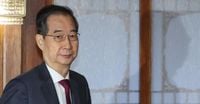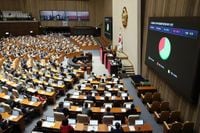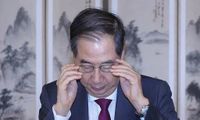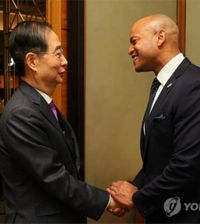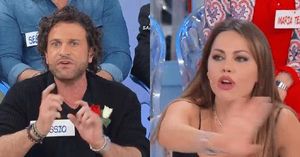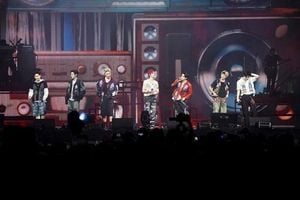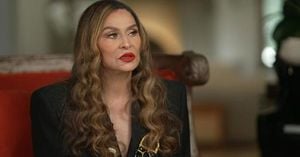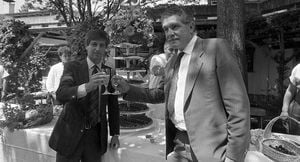SEOUL, April 17 (Yonhap) -- A recent poll indicates that six out of ten South Koreans believe it would be undesirable for acting President and Prime Minister Han Duck-soo to run in the upcoming presidential election scheduled for June 3, 2025. Conducted by Embrain Public, KSTAT Research, Korea Research, and Hankook Research, the National Barometer Survey revealed that 66 percent of respondents deemed Han's candidacy undesirable, significantly overshadowing the 24 percent who found it desirable.
The survey, which included 1,001 adults aged 18 and older, was carried out from April 14 to April 16, 2025, and has a margin of error of plus or minus 3.1 percentage points at a 95 percent confidence level. Notably, support for Han's candidacy was overwhelmingly negative among the liberal Democratic Party of Korea (DPK) supporters, with 91 percent opposing his potential run.
In contrast, among supporters of the conservative People Power Party (PPP), 55 percent viewed Han's candidacy as desirable, while 38 percent opposed it. Approximately 10 percent of respondents expressed uncertainty or did not respond.
Despite these sentiments, Han has not registered to compete in the PPP's primary, leading to speculation about his future political ambitions. Some analysts suggest that if Han were to run as an independent candidate, potentially merging his campaign with a conservative candidate, it could significantly alter the political landscape.
In related political developments, the National Assembly passed a revision to the Constitutional Court Act on the same day, which prohibits an acting president from nominating Constitutional Court justices. This legislation, primarily pushed by the Democratic Party, was approved during a plenary session with 188 lawmakers voting in favor and 106 against out of 294 members present.
The revision also allows current justices to extend their tenure until successors are appointed. It specifically states that if the president is absent due to various circumstances, the acting president cannot nominate justices, thereby limiting their powers.
This legislative move comes in light of concerns surrounding Han's attempts to nominate Lee Wan-kyu and Ham Sang-hoon as justices to replace those set to retire. However, the Constitutional Court had already issued an injunction on April 16, suspending Han's nominations, effectively rendering the new law moot.
Criticism of Han has intensified, particularly from the DPK, which accused him of overstepping his authority. Park Chan-dae, the acting leader of the DPK, stated that Han "had no authority from the outset to nominate justices on behalf of the president," calling for him to withdraw the nominations and apologize to the public for his actions.
Senior DPK official Kim Min-seok staged a protest in front of the Government Complex in central Seoul, highlighting Han's perceived ambition over the integrity of the electoral process. He criticized Han's actions as a "severe case of presidential ambition from an old man's vanity," emphasizing the need for political neutrality during the election period.
Amidst the political turmoil, Han's diplomatic engagements with the United States have also come under scrutiny. Some DPK members have accused him of leveraging national interests for personal gains, particularly following a phone call with U.S. President Donald Trump, which they claim was used for media manipulation.
However, not all within the DPK are dismissive of Han's trade negotiations. Lawmaker Kim Young-jin acknowledged the importance of maintaining the Korea-U.S. Free Trade Agreement but stressed that major decisions should be left to the next elected administration. This sentiment was echoed by DPK Rep. Chai Hyun-il, who cautioned against aligning too closely with U.S. policy directions.
Calls for a second impeachment of Han have subsided following the Constitutional Court's injunction regarding his justice nominations. DPK Rep. Jung Sung-ho stated that pushing for impeachment could destabilize the public, suggesting a wait-and-see approach.
Nonetheless, some party leaders have indicated that impeachment remains a potential option if Han decides to pursue a presidential run. DP senior spokesperson Cho Seung-rae noted that the political landscape is fluid, likening the situation to Schrödinger's cat, suggesting that impeachment could be a card they might play depending on how events unfold.
In a separate poll regarding former President Yoon Suk Yeol, it was revealed that a majority of South Koreans believe his endorsement would not benefit any politician's presidential campaign. Following Yoon's impeachment on December 14, 2024, and its subsequent confirmation by the Constitutional Court on April 4, 2025, 63 percent of respondents in a poll conducted by Dailian stated that Yoon's support would be unhelpful.
This sentiment was particularly strong among DPK supporters, with 80 percent agreeing that Yoon's endorsement would not be beneficial. The poll, which targeted voters nationwide, had a response rate of 4.5 percent.
As the political landscape in South Korea continues to evolve, the implications of these surveys and legislative actions could have significant impacts on the upcoming presidential election and the future of the country's political dynamics.
